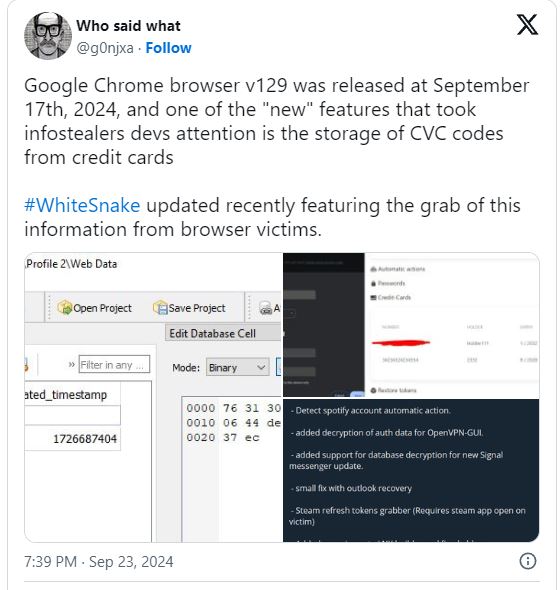The White Snake malware has been updated to take advantage of a new feature in the latest Google Chrome version. This update lets malware steal CVC codes from credit cards saved in browsers, posing a serious online security threat, according to reports on X.

By infosecbulletin
/ Wednesday , September 17 2025
A threat actor claims to have breached Link3, a major IT solutions and internet service provider based in Bangladesh. The...
Read More
By infosecbulletin
/ Wednesday , September 17 2025
Check point, a cyber security solutions provider hosts an event titled "securing the hyperconnected world in the AI era" at...
Read More
By infosecbulletin
/ Tuesday , September 16 2025
Cross-Site Scripting (XSS) is one of the oldest and most persistent vulnerabilities in modern applications. Despite being recognized for over...
Read More
By infosecbulletin
/ Monday , September 15 2025
Every day a lot of cyberattack happen around the world including ransomware, Malware attack, data breaches, website defacement and so...
Read More
By infosecbulletin
/ Monday , September 15 2025
A critical permission misconfiguration in the IBM QRadar Security Information and Event Management (SIEM) platform could allow local privileged users...
Read More
By infosecbulletin
/ Monday , September 15 2025
Australian banks are now using bots to combat scammers. These bots mimic potential victims to gather real-time information and drain...
Read More
By infosecbulletin
/ Saturday , September 13 2025
F5 plans to acquire CalypsoAI, which offers adaptive AI security solutions. CalypsoAI's technology will be added to F5's Application Delivery...
Read More
By infosecbulletin
/ Saturday , September 13 2025
The Villager framework, an AI-powered penetration testing tool, integrates Kali Linux tools with DeepSeek AI to automate cyber attack processes....
Read More
By infosecbulletin
/ Saturday , September 13 2025
Samsung released its monthly Android security updates, addressing a vulnerability exploited in zero-day attacks. CVE-2025-21043 (CVSS score: 8.8) is a...
Read More
By infosecbulletin
/ Saturday , September 13 2025
Albania has appointed the first AI-generated government minister to help eliminate corruption. Diella, the digital assistant meaning Sun, has been...
Read More
Chrome’s New Feature Draws Attention:
Google Chrome version 129, released on September 17, 2024, added new features for a better user experience.
One such feature is the ability to store CVC codes from credit cards directly within the browser for easier online transactions.
This feature was meant to simplify payments but has unintentionally drawn the attention of cybercriminals and infostealer developers.
White Snake Malware Update:
White Snake has swiftly adapted to this new opportunity. Malware developers have improved their tools to target and extract stored CVC codes from victims’ browsers. This upgrade enables White Snake to collect full credit card information, facilitating fraud and theft for cybercriminals.
White Snake’s use of the new Chrome feature highlights the ongoing struggle between software developers and cybercriminals. Users should be careful when storing sensitive information in browsers and consider using password managers or secure payment platforms instead.
Cybersecurity experts advise users to keep their security software updated and stay alert for any suspicious account activity. Google will fix this vulnerability in future updates, but users should take steps now to protect their financial information.

 InfoSecBulletin Cybersecurity for mankind
InfoSecBulletin Cybersecurity for mankind














